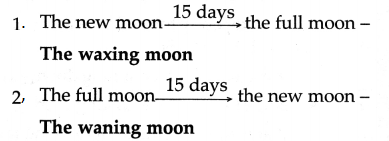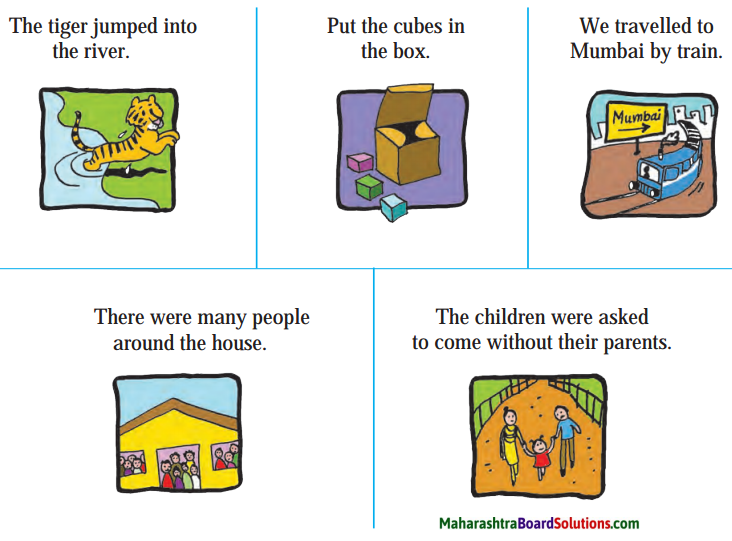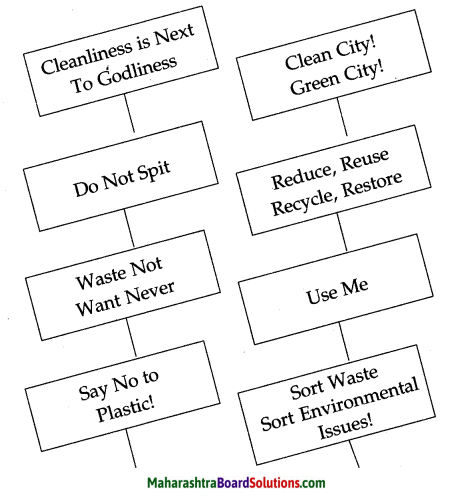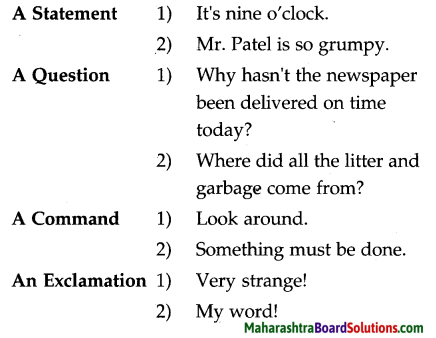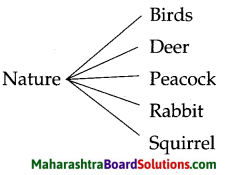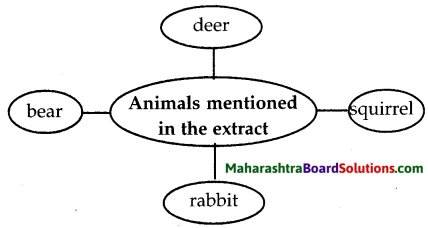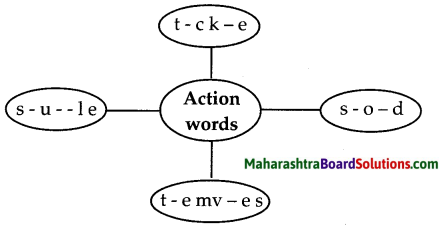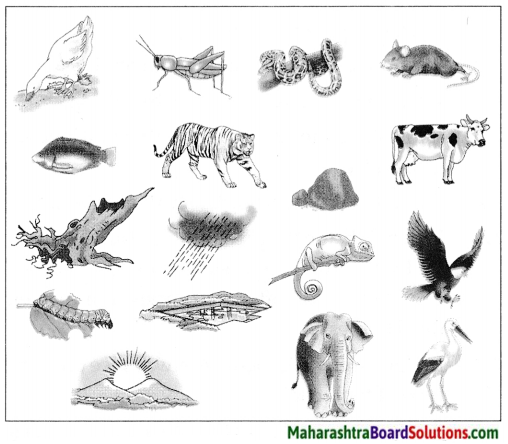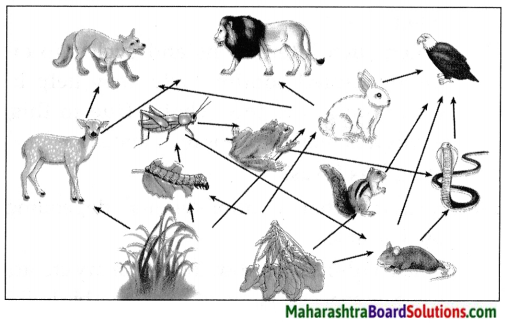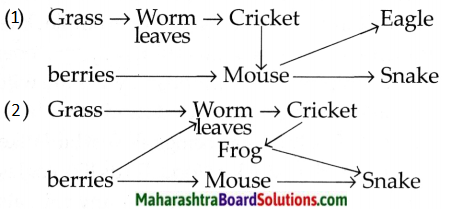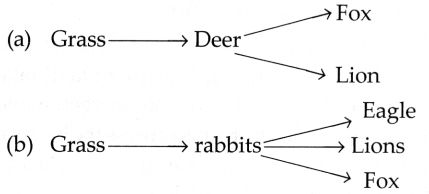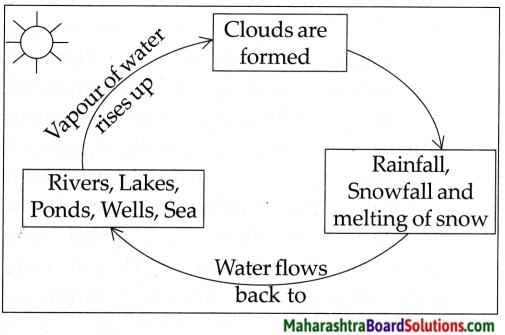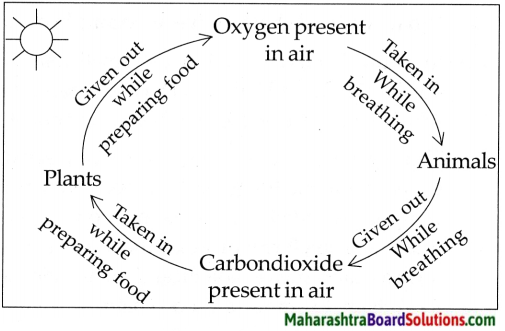Balbharti Maharashtra State Board Class 5 English Solutions Chapter 16 Write your own Story Notes, Textbook Exercise Important Questions and Answers.
Maharashtra State Board Class 5 English Solutions Chapter 16 Write your own Story
English Balbharati Std 5 Digest Chapter 16 Write your own Story Textbook Questions and Answers
Activities :
Answer the following.
Question 1.
How many types of stories are mentioned in the lesson?
Answer:
There are ten types of stories mentioned in the lesson.
Question 2.
What is a fantasy?
Answer:
A fantasy is an imaginary story nothing close to reality.
![]()
Question 3.
Complete the following web diagram:
Answer:

Writing Skills :
Question 1.
Write two stories with a moral. Give a suitable title.
Answer:
1. Greed leads to grief Many years ago, in a small village lived Ken who was different from the other farmers of his locality. Reason? He had a goose which laid an egg. What’s so great you ask? Well it laid a golden egg each day. Ken was happy and content at first but greed got the better of him. He imagined how wonderful it would be to get all the golden eggs from within the goose at one go.
He decided to kill the bird. For a moment he did not stop to think of all the good fortune the good goose had brought him.
There was no sense of gratitude left in him without any pity, the wicked farmer cut the goose open. Kenwas disappointed when he realized that its magical goose was just like any other goose, there were no golden eggs within. If only someone had told him, what the wise always say: ‘Greed leads to grief’.
2. An ideal teacher. Devraya was a great teacher. He taught his pupils how to make beautiful statues. At the time when this incident took place the great preceptor Devraya had many students learning under him. Among them was Gopal.
Devraya assigned the task of sculpting a beautiful statue to Gopal. Gopal had done a beautiful job but Devaraya pointed out that the nose was not perfect. Devraya insisted that he worked on it till perfection was achieved.
Devraya deliberately did it for reasons known only to him. Finally disappointed, Gopal left the room. After some time Devraya entered the room and said to no one in particular. “This statue is indeed a beautiful piece of out. It is a work of perfection”
Devraya noticed that Gopal too had entered the and that he was standing with a stunned expression Devraya patted him on his shoulder and said, “Your work was near perfection when I first saw it. But if I would praise you, you would not think of improving your skills. This perfection you see today is a result of your efforts to be better than the best”.
Gopal bowed down to the true Guru and promised that his life would be dedicated to find perfection in the field he had chosen. ‘Practice makes a man perfect’.
![]()
Write your own Story Summary in English
Summary :
A story is an account of people, real or imaginary and events which are narrated for entertainment Stories may be true or fictitious. They may be in prose form or in the form of poetry. There are various elements which make a story interesting like the characters, the setting i.e., the time and place where it has occurred, the scenic description i.e. the landscape, the weather etc, the plot i.e., the events and actions included and above all the central idea or theme. The lesson ‘Write Your Own Story’ provides us guidelines to become a good storyteller.
![]()
Meanings :
- elf (n) – a supernatural creature in folk tales, represented as a small, delicate human figure with pointed ears.
- acrobat (n) – an entertainer who performs gymnastic feats.
- hawker (n) – a person who moves about from one place to another selling goods.
- story (n) – an account/narration of an event which may or may not be true.
- fairy tale (n) – A story about fairies narrated to amuse children/imaginary stories about magical creatures.
- fantasy (n) – imaginary story which is nothing close to reality.
- mystery (n) – something that is difficult or impossible to understand or explain.
- adventure (n) – a story about an exciting experience
- ordinary (adj) – a typical story
- success story (n) – an account of the success achieved by any successful person/ organisation etc.
- funny (adj) – causing laughter or amusement
- science fiction (n) – fiction based on scientific imagination
- tragic (adj) – extremely distressing or sad
- play (n) – a story which is dramatised on the stage
